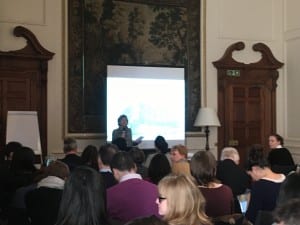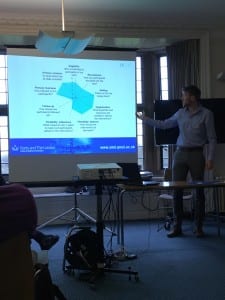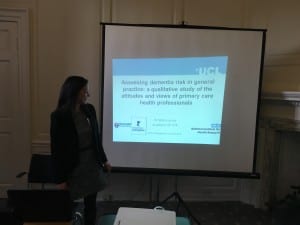Academic Primary Care – Not sinking, nor swimming, but motoring!
By Nathan Davies, on 14 March 2016
This month Rammya Mathew an Academic Clinical Fellow from the Centre for Ageing Population Studies talks about her first and very impressive first time at the SAPC regional Madingley conference which this year we hosted.
This was my first experience of SAPC, and what a fantastic introduction it was. The conference was jam-packed with inspirational speakers, some of whom have paved the way for academic primary care, and many more who look set to be future leaders within the field. The question posed to us by the chair, Professor Elizabeth Murray, was ‘Innovatio n in a sea of change – will academic primary care sink or swim?’. However, the overwhelming attendance and the enthusiasm among delegates spoke volumes in itself, and provided a sound evidence base for the conclusion, which I will share later.
n in a sea of change – will academic primary care sink or swim?’. However, the overwhelming attendance and the enthusiasm among delegates spoke volumes in itself, and provided a sound evidence base for the conclusion, which I will share later.
The opening keynote speech by Professor Martin Marshall challenged our views of traditional research. The need to bridge the gap between the knowledge base that academia provides, and what actually happens in clinical practice was brought to our attention. He introduced the concept of participatory research, and by sharing his own experiences of being an embedded researcher in East London, he demonstrated the impact that this model may have in terms of knowledge creation and mobilisation.
The ‘Dragon’s Den’ was an exciting new addition this year. For some reason, our esteemed judges got slightly confused and enacted the ‘Strictly come dancing’ panel instead. But we had to forgive their mishap, as their sense of humour more than compensated for the error. The calibre of the candidates that were pitching was truly remarkable. Dr Kingshuk Pal from UCL propositioned HELP DIABETES – a fully-fledged online website that supports self management of diabetes.  However, the dragons were fierce in expressing their concern that HELP DIABETES would be another tool best suited to those who are already self motivated. The second pitch was by the medical education department at Imperial College London, who were asking for all medi
However, the dragons were fierce in expressing their concern that HELP DIABETES would be another tool best suited to those who are already self motivated. The second pitch was by the medical education department at Imperial College London, who were asking for all medi
cal students to go to jail!  They put forward a passionate argument that this would improve their understanding of health inequalities and provide experiential learning of working with marginalised groups. This was a moving presentation that tugged at the heart strings of the audience, but the dragons questioned what would be removed from the curriculum in order to make way for this initiative. The last and final pitch was an online pathway, which offered advice, testing and treatment for chlamydia. Being practical and having demonstrated proof of success, it sealed the deal.
They put forward a passionate argument that this would improve their understanding of health inequalities and provide experiential learning of working with marginalised groups. This was a moving presentation that tugged at the heart strings of the audience, but the dragons questioned what would be removed from the curriculum in order to make way for this initiative. The last and final pitch was an online pathway, which offered advice, testing and treatment for chlamydia. Being practical and having demonstrated proof of success, it sealed the deal. 
One of the things that stood out to me from the presentations at SAPC this year, was that the conference clearly demonstrated the excellent insights that well-conducted qualitative research can offer. A particular presentation which highlighted this was by, Dr Nadia LLanwarne from Cambridge. She presented the findings of her research, exploring the missed opportunities for diagnosing melanoma in primary care and the patient experience along this journey from initial presentation to diagnosis. I certainly came away from the conference this year, feeling assured that qualitative research is both valuable and necessary – its role was cemented, in terms of putting quantitative research into context and relating it to the real and often ‘messy’ world we face in general practice.
Professor Roger Jones, editor of the BJGP, rounded up the conference with an excellent plenary session. Using his personal story, he talked about the degree of change we have seen in primary care over the years – across academia, education and clinical practice. It was a real eye-opener! It was encouraging to hear the he still looks forward to going to work everyday and has maintained his enthusiasm for general practice, despite the ever changing working environment. Finally, the conference came to a close and we unanimously concluded that academic primary care was not sinking, nor swimming, but was indeed motoring!
 Close
Close




